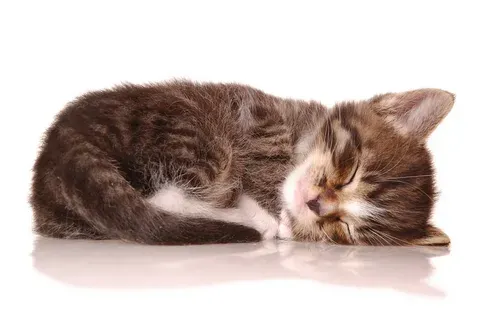Cat Sleeping Habits

Sleeping Habits of Cats
Cats are known for their incredible sleeping habits. They can sleep up to 16 hours a day, sometimes even more! However, their sleeping patterns are not as straightforward as you might think. In this article, we'll delve deeper into the sleeping habits of cats and explore why they sleep so much.
Creating a Good Sleeping Environment for Your Cat
Cats are creatures of comfort, and they like to sleep in warm, cozy places. Here are some tips for creating a good sleeping environment for your cat:
Beds
Many cats enjoy sleeping on their owners' beds or in their own cat beds. These provide a comfortable and warm place for them to rest.
Sofas and Chairs
Cats may also choose to sleep on sofas, chairs, or other soft pieces of furniture. This allows them to stretch out and relax in a cozy spot.
Boxes and Hideaways
Cats are known for their love of boxes and small spaces. They may choose to sleep in a cardboard box, a cozy cat bed, or a small hideaway spot.
High Spots
Cats are natural climbers, so they may choose to sleep in high spots, such as on top of bookcases or shelves. These spots provide a safe and secure place for them to rest.
Why Do Cats Sleep So Much?
Cats are known for their sleeping habits, but why do they sleep so much? One reason is that cats are predators. Hunting and catching prey can be exhausting work, so cats need plenty of rest to recover. Additionally, cats have a higher metabolic rate than humans, which means they burn energy more quickly. Sleeping allows them to conserve energy and stay alert when they need to be.
The Sleep Cycle of Cats
Cats have a unique sleep cycle that differs from that of humans. They have two distinct phases of sleep: rapid eye movement (REM) sleep and non-rapid eye movement (NREM) sleep.
During REM sleep, cats experience rapid eye movements, just like humans do. This is when cats are most likely to dream. You may notice your cat twitching or making noises during this phase of sleep.
NREM sleep is a deeper sleep phase. Cats spend more time in NREM sleep than REM sleep. During this phase, their body is more relaxed, and their breathing and heart rate slow down.
Cats can fall asleep quickly and easily, but they can also wake up suddenly and be alert within seconds. This ability to switch between sleep and wakefulness is known as "catnapping."
Factors Affecting a Cat's Sleep
While cats do sleep a lot, their sleeping habits can be affected by several factors. Some of these factors include:
Age
Kittens and senior cats tend to sleep more than adult cats. Kittens need plenty of rest to grow and develop, while senior cats may sleep more due to age-related health issues.
Diet
A cat's diet can affect their sleep. If a cat is not getting enough nutrients, they may feel lethargic and sleep more. Conversely, if a cat is eating too much, they may feel restless and have trouble sleeping.
Environment
Cats are creatures of habit, and they like routine. Changes in their environment, such as moving to a new home or rearranging furniture, can disrupt their sleep patterns.
Health
Illness or pain can affect a cat's sleep. If your cat is sleeping more than usual, it's a good idea to take them to the vet to rule out any underlying health issues.
Signs of Sleep Disorders in Cats
While cats do sleep a lot, excessive sleepiness can be a sign of a sleep disorder. Some signs to watch for include:
Insomnia
If your cat is having trouble falling or staying asleep, they may have insomnia. Signs of insomnia include restlessness, pacing, or vocalizing at night.
Stress
Cats are sensitive animals, and stress can affect their sleep. Loud noises, changes in routine, and new environments can all cause stress and disrupt a cat's sleep.
Sleep Apnea
Sleep apnea is a condition in which a cat's breathing is disrupted during sleep. This can lead to snoring, gasping, or choking sounds during sleep.
Narcolepsy
Narcolepsy is a rare condition in cats. It causes sudden, uncontrollable episodes of sleepiness during the day. If you suspect your cat has a sleep disorder, it's important to take them to the vet for a diagnosis.
Appreciate the creator